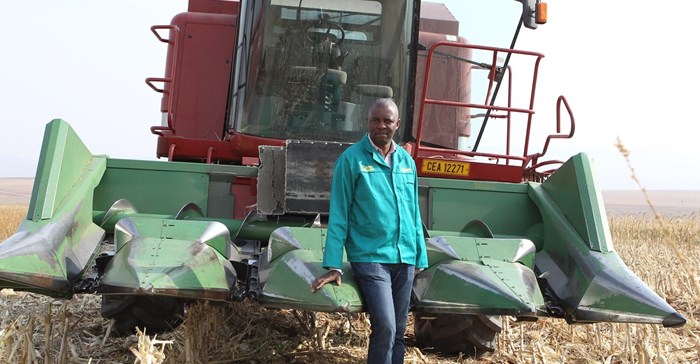
Top stories






More news


Marketing & Media
Ads are coming to AI. Does that really have to be such a bad thing?














Speaking at the launch of the harvest season in Ncora yesterday by Eastern Cape Premier Phumulo Masualle, ECRDA chief executive Thozi Gwanya says a total of 1,003 hectares (ha) of white maize were planted in the hub which is made up of 10 primary cooperatives. Ncora is one of four RED Hubs in the province which planted 2,925ha of white maize while the fourth one planted 829ha of grain sorghum.
The establishment of the hubs comes after development financier ECDC and ECRDA submitted a joint application to the Development Bank of Southern Africa (DBSA) Jobs Fund to develop agriculture and beneficiation hubs in the province. DBSA subsequently made available R91 million over a three-year period for the development of these hubs in Ncora and Mqanduli. In terms of the agreement, the DBSA would fork out 80% of the funds while 20% would be split equally between ECDC and ECRDA as the implementing agents.
"In the last financial year, a total of R51 million was spent on the development of the two hubs. The funds were spent on primary production of white maize on both sites, on the development of mechanisation units in the form of machinery and implements and infrastructure development.
"This is an important milestone for the Ncora and Mqanduli RED Hubs which are in their second year of harvesting. We are therefore excited with the improved yield estimates for this season," says Gwanya.
ECDC agro-processing specialist Mlamli Nodada says a total of 16 tractors and two bakkies have been bought for both sites, a self-propelled combine harvester in Mqanduli, two-trailed harvesters in Ncora as well as implements such as disc, planters, cultivators, boom sprayers among other implements. Funds were also spent on the establishment of grain silos and the purchase of a new one-ton-per-hour processing capacity mill for Ncora which can be extended to three-tons-per-hour and the servicing of an existing 1,5 tons-per-hour mill in Mqanduli.
"In Mqanduli the existing 500-ton silo was extended to 750 tons. In addition, a new 750-ton silo was built to complement the refurbished one, bringing total storage capacity at the site to 1,500 tons. At Ncora, two silos with a storage capacity of 2,000 tons were constructed," Nodada says.
ECRDA agronomist Luvo Qongqo says in the second quarter of 2014/15, white maize planted in 2013/14 was harvested on the 911ha and 955ha planted in Mqanduli and Ncorha respectively. The Ncorha site had 706 beneficiaries who are the landowners as well as 256 in Mqanduli. In Mqanduli, the yield was 564,38 tons while in Ncora the yield was 1,738 tons.
Qongqo says ECRDA was also able to expand its RED Hub footprint through a R100 million injection from the Eastern Cape Treasury over a three-year period. The funds were directed toward the development of RED Hubs in Mbizana with 13 participating primary cooperatives and six in Lady Frere. In Lady Frere a total of 574 landowners are beneficiaries while 1,112 in Mbizana will benefit. In Mbizana 983 ha of white maize were planted while 829ha of grain sorghum were planted in Lady Frere.
A total of R59 million was spent on both sites toward primary production, procurement of machinery, implementing grain silos, milling, mechanisation and trading sheds as well as the establishment of a milling plant. In Lady Frere there is an existing mill which was used to process sorghum and maize. However, a decision has since been taken to only mill maize. There is an existing off-take agreement with Border Seed to buy the grain sorghum. In Mbizana a new mill and milling shed were procured. A trading shed and mechanisation shed should be completed in the new financial year.
In Mbizana eight tractors were bought, a combine harvester, a bakkie and implements. In Lady Frere six tractors, a combine harvester, bakkie and implements were also procured.
The hubs are run according to ECRDAs RED Hub model which prioritises the village as the centre of operation. In practice, the RED Hub concept ensures that production is done by the community, produce is milled in the community, processed and packaged in the community and even sold back into the community with the whole process being owned by these communities. Communities benefit by contributing their own land which has been lying fallow for many years for production.